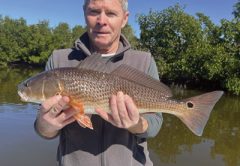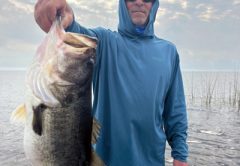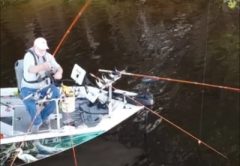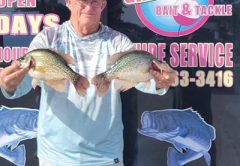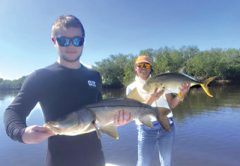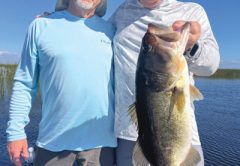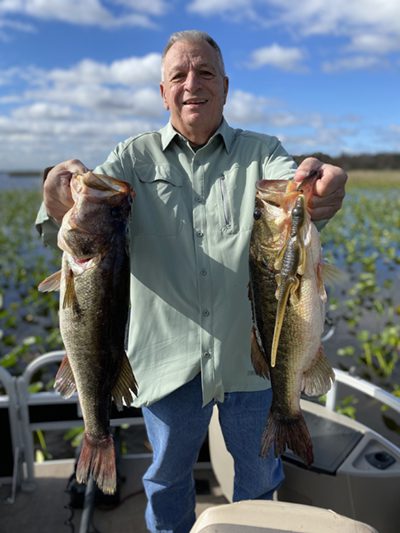
There was nothing unusual about the bass fishing guide trip I planned for mid-January with my new client, Lou Toscano, from Lake Placid. I had never met him, but he sounded like a nice guy on the phone, and he’d gotten my name from a friend.
I left the house around 6 am, figuring I’d get to the boat ramp early, get the boat in the water, and be ready to go around 7 am. We’d agreed to meet at Windy Point, although I preferred going out of Istokpoga Park on the north end of the lake. The Weather Channel indicated winds out of the east at 15 to 20 mph and I knew the Windy Point ramp would be taking a beating.
As I drove south on Rt 27, I thought about how tough the fishing had been over the last few weeks. Cold fronts, rain, and wind had the lake muddied up, and the fishing had been tough since Christmas. The bass should be on their beds this time of the year, or at the very least, in a pre-spawn mode, but with the water stirred up from the wind, seeing any beds was pretty unlikely.
Lou had mentioned that he wanted to try a new lure, some wake bait or creature bait that he claimed was great for bass. I hoped he was right cause we’d probably need all the help we could get on this trip. Lou was early, so we loaded up and by 7 am, we were casting spinnerbaits and frogs into and around the pads and bullrushes. The water was calm and as the sun rose, Lou showed me his new creation. A small, plastic alligator (Gator Belly Baits). Hmmmmmmm. I’ve been a bass fishing guide for thirty years and had never seen anything like it.

When I was a kid in Ohio, I raised a small alligator. I think they were called caiman’s. I’d kept it in an old aquarium until it got too big for the tank. I remember I traded it for a new spinning reel. My first thought was to reach down and grab a couple of the critters. They were so cute, but a loud grunt from just a few feet away on shore reminded me that their mama was probably nearby, and I was not interested in meeting her.
I reversed my electric motor and backed away from the area and started fishing. I noticed other small gators, maybe an inch or two longer than the babies swimming along the deeper edge of the pads when a huge bass came out of nowhere and struck one of them. It was an incredible sight!
Throughout the day, I continued to hear loud splashes back inside the vegetation and I knew the bass were having a field day eating the small gators.
Handing the plastic gator back to Lou, I promised we’d try it later in the day. As I had expected, it was tough fishing. I caught a couple of small males on a white spinnerbait and Lou lost a pretty nice fish on a topwater frog, but after three hours, we had little to show for our efforts.
Lou wanted to try his new plastic gator, so I rigged it up on a stout baitcasting rod with a 65-pound braided line. He wasn’t quite sure how to rig it, and I had to agree that it could be rigged several ways, but I decided to rig it weedless. It seemed that it should probably be worked along the surface, the only place I’d ever seen an alligator swimming. But it’s heavy, and the bulk of the gator makes it difficult to keep on top. I tried different retrieves but there didn’t seem to be a way to retrieve the gator without it flopping or twisting, so I just let it sink to the bottom. I explained to Lou how difficult it was to keep the gator swimming along the surface like a wake bait, and that I could probably add a nail weight to balance it out when I noticed my line was moving. I reeled in the slack and set the hook on a nice three-pounder.
After I landed the fish, I remembered catching a few small alligators (not as small as the one Lou created, but maybe 12-18”), right off the bottom on a plastic worm or a jig in the past. I’d forgotten that alligators spend much time underwater, not just on the surface.
I handed Lou the rod as I rigged up another rod for myself when I saw him stand up to set the hook on another bass that fell prey to the gator bait. This was amazing. We hadn’t done much of anything all morning, and within ten minutes, we had a couple of decent-sized bass. I had one big fish that broke water and literally threw the gator back at us. It was a nice female of six or seven pounds.
Over the next two hours, we caught and released another four bass, all caught on the gator bait within 500 yards of each other. I told Lou I was surprised the bait worked so well in the murky water, but more importantly, that it would be effective this early in the year.
I remember reading about alligators, and the article said they usually lay their eggs in late May to mid-June and that the incubation period is a couple of months. Newly hatched gators are only six to eight inches long and only grow a few inches yearly. Some of their nests are destroyed by predators or flooding, and many fall prey to raccoons, birds, large fish, and even larger gators. I’d never considered bass eating gators, but I’m sure they do.
One thing I knew for sure was that bass are very protective. I’ve seen them attack bluegills and other creatures attempting to steal their eggs, including turtles. I’m sure small alligators raid their nests as well.
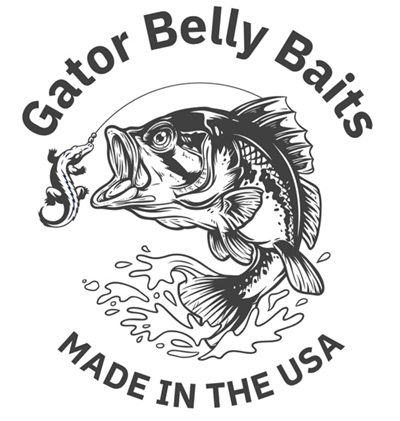
It makes sense when you think about it; lure manufacturers make plastic worms, lizards, and other plastic baits in a variety of sizes, shapes, and colors. Why not an alligator? It makes a good meal for a bass.
Whatever the reason, the bass we caught that day appeared to like the little alligator. If I had to guess, they probably thought it was searching along the bottom for their beds to eat their eggs.
One thing is for sure, the bass in our lakes have seen virtually every creature bait you can imagine, but I don’t think they’ve ever seen a fat little alligator!

